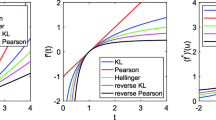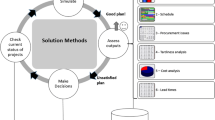Abstract
We consider multidimensional optimization problems in the framework of tropical mathematics. The problems are formulated to minimize a nonlinear objective function that is defined on vectors over an idempotent semifield and calculated by means of multiplicative conjugate transposition. We start with an unconstrained problem and offer two complete direct solutions to demonstrate different practicable argumentation schemes. The first solution consists of the derivation of a sharp lower bound for the objective function and the solving of an equation to find all vectors that yield the bound. The second is based on extremal properties of the spectral radius of matrices and involves the evaluation of this radius for a certain matrix. This solution is then extended to problems with boundary constraints that specify the feasible solution set by a double inequality, and with a linear inequality constraint given by a matrix. To illustrate one application of the results obtained, we solve problems in project scheduling under the minimum makespan criterion subject to various precedence constraints on the time of initiation and completion of activities in the project. Simple numerical examples are given to show the computational technique used for solutions.
Similar content being viewed by others
References
Akian, M., Bapat, R., & Gaubert, S. (2007). Max-plus algebra. In L. Hogben (Ed.), Handbook of linear algebra, discrete mathematics and its applications (pp. 25-1–25-17). Boca Raton: Taylor and Francis. doi:10.1201/9781420010572.ch25.
Akian, M., Gaubert, S., & Guterman, A. (2012). Tropical polyhedra are equivalent to mean payoff games. International Journal of Algebra and Computation, 22(1), 1250,001-1–1250,001-43. doi:10.1142/S0218196711006674.
Aminu, A., & Butkovič, P. (2012). Non-linear programs with max-linear constraints: A heuristic approach. IMA Journal of Management Mathematics, 23(1), 41–66. doi:10.1093/imaman/dpq020.
Butkovič, P., & Tam, K. P. (2009). On some properties of the image set of a max-linear mapping. In: G. L. Litvinov, S. N. Sergeev (Eds.), Tropical and Idempotent Mathematics. Contemporary Mathematics, vol. 495 (pp. 115–126). AMS (2009). doi:10.1090/conm/495/09694.
Butkovič, P. (2010). Max-linear systems: Theory and algorithms. Springer monographs in mathematics. London: Springer. doi:10.1007/978-1-84996-299-5.
Butkovič, P., & Aminu, A. (2009). Introduction to max-linear programming. IMA Journal of Management Mathematics, 20(3), 233–249. doi:10.1093/imaman/dpn029.
Cuninghame-Green, R. A. (1962). Describing industrial processes with interference and approximating their steady-state behaviour. Operations Research Quarterly, 13(1), 95–100.
Cuninghame-Green, R. A. (1991). Minimax algebra and applications. Fuzzy Sets and Systems, 41(3), 251–267. doi:10.1016/0165-0114(91)90130-I.
Cuninghame-Green, R. A. (1994). Minimax algebra and applications. In P. W. Hawkes (Ed.), Advances in imaging and electron physics (Vol. 90, pp. 1–121). San Diego: Academic Press. doi:10.1016/S1076-5670(08)70083-1.
De Schutter, B. (1996). Max-algebraic system theory for discrete event systems. Ph.D. thesis, Katholieke Universiteit Leuven, Leuven.
De Schutter, B., & van den Boom, T. (2001). Model predictive control for max-plus-linear discrete event systems. Automatica, 37(7), 1049–1056. doi:10.1016/S0005-1098(01)00054-1.
Demeulemeester, E. L., & Herroelen, W. S. (2002). Project scheduling: A research handbook. International series in operations research and management science (Vol. 49). New York: Kluwer Acad. Publ.
Elsner, L., & van den Driessche, P. (2004). Max-algebra and pairwise comparison matrices. Linear Algebra and its Applications, 385(1), 47–62. doi:10.1016/S0024-3795(03)00476-2.
Elsner, L., & van den Driessche, P. (2010). Max-algebra and pairwise comparison matrices, II. Linear Algebra and its Applications, 432(4), 927–935. doi:10.1016/j.laa.2009.10.005.
Gaubert, S. (1995). Resource optimization and (min, +) spectral theory. IEEE Transactions on Automatic Control, 40(11), 1931–1934. doi:10.1109/9.471219.
Gaubert, S., Katz, R. D., & Sergeev, S. (2012). Tropical linear-fractional programming and parametric mean payoff games. Journal of Symbolic Computation, 47(12), 1447–1478. doi:10.1016/j.jsc.2011.12.049.
Giffler, B. (1963). Scheduling general production systems using schedule algebra. Naval Research Logistics Quarterly, 10(1), 237–255. doi:10.1002/nav.3800100119.
Golan, J. S. (2003). Semirings and affine equations over them: Theory and applications. Mathematics and its applications (Vol. 556). Dordrecht: Kluwer Acad. Publ.
Gondran, M., & Minoux, M. (2008). Graphs, dioids and semirings: New models and algorithms. Operations research/computer science interfaces, vol. 41. Springer, New York. doi:10.1007/978-0-387-75450-5.
Gursoy, B. B., Mason, O., & Sergeev, S. (2013). The analytic hierarchy process, max algebra and multi-objective optimisation. Linear Algebra and its Applications, 438(7), 2911–2928. doi:10.1016/j.laa.2012.11.020.
Heidergott, B., Olsder, G. J., & van der Woude, J. (2006). Max-plus at work: Modeling and analysis of synchronized systems. Princeton series in applied mathematics. Princeton: Princeton Univ. Press.
Krivulin, N. (2012). A new algebraic solution to multidimensional minimax location problems with Chebyshev distance. WSEAS Transactions on Mathematics, 11(7), 605–614.
Krivulin, N. (2013). Explicit solution of a tropical optimization problem with application to project scheduling. In D. Biolek, H. Walter, I. Utu, & C. von Lucken (Eds.), Mathematical methods and optimization techniques in engineering (pp. 39–45). Athens: WSEAS Press.
Krivulin, N. (2014a) Complete solution of a constrained tropical optimization problem with application to location analysis. In: P. Höfner, P. Jipsen, W. Kahl, M.E. Müller (Eds.), Relational and algebraic methods in computer science. Lecture notes in computer science, vol. 8428 (pp. 362–378). Cham: Springer.
Krivulin, N. (2014b). A constrained tropical optimization problem: Complete solution and application example. In: G.L. Litvinov, S.N. Sergeev (Eds.), Tropical and idempotent mathematics and applications. Contemporary mathematics, vol. 616 (pp. 163–177). AMS, Providence, RI. doi:10.1090/conm/616/12308
Krivulin, N. (2015a). A maximization problem in tropical mathematics: A complete solution and application examples. Informatica.
Krivulin, N. (2015b). Extremal properties of tropical eigenvalues and solutions to tropical optimization problems. Linear Algebra and its Applications, 468, 211–232. doi:10.1016/j.laa.2014.06.044.
Krivulin, N. (2015c). A multidimensional tropical optimization problem with nonlinear objective function and linear constraints. Optimization, 64(5), 1107–1129. doi:10.1080/02331934.2013.840624.
Krivulin, N. K. (2009). Methods of idempotent algebra for problems in modeling and analysis of complex systems. St. Petersburg: Saint Petersburg Univ. Press. (in Russian).
Krivulin, N. K. (2011). An extremal property of the eigenvalue for irreducible matrices in idempotent algebra and an algebraic solution to a Rawls location problem. Vestnik St. Petersburg University: Mathematics, 44(4), 272–281. doi:10.3103/S1063454111040078.
Krivulin, N., & Zimmermann, K. (2013). Direct solutions to tropical optimization problems with nonlinear objective functions and boundary constraints. In D. Biolek, H. Walter, I. Utu, & C. von Lucken (Eds.), Mathematical methods and optimization techniques in engineering (pp. 86–91). Athens: WSEAS Press.
McEneaney, W. M. (2006). Max-plus methods for nonlinear control and estimation. Systems and control: Foundations and applications. Birkhäuser, Boston,. doi:10.1007/0-8176-4453-9.
Speyer, D., & Sturmfels, B. (2009). Tropical mathematics. Mathematics Magazine, 82(3), 163–173.
T’kindt, V., & Billaut, J. C. (2006). Multicriteria scheduling: Theory, models and algorithms. Berlin: Springer.
Vanhoucke, M. (2013). Project management with dynamic scheduling. Berlin: Springer. doi:10.1007/978-3-642-40438-2.
Zimmermann, K. (2003). Disjunctive optimization, max-separable problems and extremal algebras. Theoretical Computer Science, 293(1), 45–54. doi:10.1016/S0304-3975(02)00231-1.
Zimmermann, K. (2006) Interval linear systems and optimization problems over max-algebras. In Linear optimization problems with inexact data (pp. 165–193). New York: Springer. doi:10.1007/0-387-32698-7_6.
Acknowledgments
The author is very grateful to two referees for their valuable comments and helpful suggestions on a previous version of the manuscript.
Author information
Authors and Affiliations
Corresponding author
Rights and permissions
About this article
Cite this article
Krivulin, N. Tropical optimization problems with application to project scheduling with minimum makespan. Ann Oper Res 256, 75–92 (2017). https://doi.org/10.1007/s10479-015-1939-9
Published:
Issue Date:
DOI: https://doi.org/10.1007/s10479-015-1939-9




